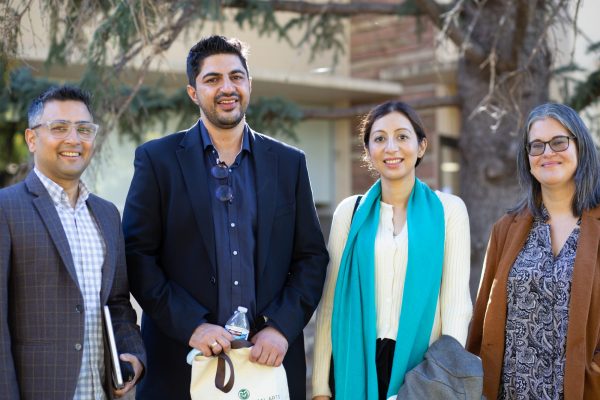Alumnus Shabda Gyawali (B.A. Economics ‘09, M.B.A. ‘11) returned to the CSU campus on October 20 to give a presentation on “The Role of Equity Fund in Sustainable Development in Developing Countries: View from Nepal.”
Hosted by the Poverty Action Center, a REDI research team focused on development economics, Gyawali spoke with Economics students and faculty about his work as Investment Director and partner at Dolma Impact Fund in Nepal.
Bordered by China and India, Nepal is exceptionally diverse in terms of its geography, environment, and population of 29 million. Since the 1990s, Nepal’s “frontier market” economy has undergone significant changes to international trade and globalization, an expanding private sector, and a more recent liberalization of economic policies that have opened the nation up to foreign investments. The nation also frequently has had to contend with and recover from massive natural disasters, including floods and earthquakes.

While Gyawali came to CSU to study economics, and then again for an Impact MBA in Sustainable Entrepreneurship, he always intended to put his education to work improving conditions in Nepal.
“As a young Nepali studying in America, I always wanted to come back home, but I thought I would join a nonprofit and work in development economics. Later, I realized that risk capital investment to support entrepreneurship is also an effective platform to support Nepal’s economic development.”
As the Investment Director for Dolma Impact Fund – the largest private equity fund focused on Nepal – Gyawali leads an investment team and strategy in Nepal’s health care, technology, and renewable energy sectors. By doing so, Dolma aims to contribute toward the country’s Sustainable Development Goals (SDGs) and move Nepal towards Middle-Income Country status by 2030.
“The cornerstone of national development strategy is to work with the private sector to achieve its goals. We believe there is a profound role for private equity in delivering employment opportunities to a dynamic young workforce by investing institutional capital.”
Gyawali was Dolma’s first employee, joining CEO Tim Gocher as a Business Development Officer in early 2011. Gyawali says when he started out, Dolma was still fund raising, so his main job was to educate investors and entrepreneurs about private equity, and then convince them of its benefits.
“Dolma is a fund manager. That means we raise a fund, invest that fund, and then try to raise another fund. Our first fund, DIF I, was $36 million that we raised in 2014 and have already invested in technology and tech-enabled companies, health care companies, and renewable energy projects. We are now working on our second fund, DIF II, which we anticipate raising $75 million which will create 12,500 jobs and contribute to health, gender equity, clean energy and climate with attractive economic returns.”
Gyawali further explained Nepal’s macroeconomic outlook as aiming to restructure its economy away from a low-productivity, high migration model to one where exports can drive growth through sustainable industrialization and high-quality job creation by leveraging technology.
“Given Nepal’s vulnerability to climate change, Dolma sees particular opportunity in clean energy space, first because the local demand for electricity has not been met. There’s a large section of the Nepali population that still lives off the grid, as well as people who are on the grid but only getting minimum electricity supply. Once that demand is met, there is a lot of opportunity for Nepal to export clean, renewable energy.”
Overall, Gyawali is optimistic about his work building Dolma’s second fund – and what that means for the future of Nepal.
“Nepal is one of the poorest countries in terms of per capita income in South Asia, but there is big opportunity. Post-constitution, we have peace in the country, and we have stable government policies, which makes us very hopeful about economic opportunity.”
In closing, Gyawali left students with a word of heartfelt advice for pursuing careers in entrepreneurship, development economics, climate finance, or any other area of economics:
“Make sure you really learn your fundamentals of micro- and macroeconomics!”